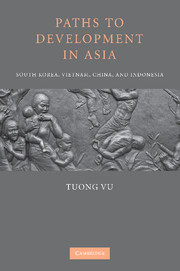Book contents
- Frontmatter
- Contents
- List of Tables and Figure
- Acknowledgments
- List of Abbreviations
- 1 State Formation Dynamics and Developmental Outcomes
- PART ONE DIVERGENT NATIONAL PATHS OF STATE DEVELOPMENT
- PART TWO VARIANTS OF ACCOMMODATION: VIETNAM AND INDONESIA COMPARED
- 6 Organizing Accommodation in Vietnam: Coalition Government, United Front, and Leninist Party
- 7 Organizing Accommodation in Indonesia: Parliament and Status-Based Parties
- 8 Talking Accommodation in Vietnam: Nation, the People, and Class Struggle
- 9 Talking Accommodation in Indonesia: Nation, the People, God, and Karl Marx
- 10 Rethinking Developmental States
- References
- Index
8 - Talking Accommodation in Vietnam: Nation, the People, and Class Struggle
Published online by Cambridge University Press: 04 August 2010
- Frontmatter
- Contents
- List of Tables and Figure
- Acknowledgments
- List of Abbreviations
- 1 State Formation Dynamics and Developmental Outcomes
- PART ONE DIVERGENT NATIONAL PATHS OF STATE DEVELOPMENT
- PART TWO VARIANTS OF ACCOMMODATION: VIETNAM AND INDONESIA COMPARED
- 6 Organizing Accommodation in Vietnam: Coalition Government, United Front, and Leninist Party
- 7 Organizing Accommodation in Indonesia: Parliament and Status-Based Parties
- 8 Talking Accommodation in Vietnam: Nation, the People, and Class Struggle
- 9 Talking Accommodation in Indonesia: Nation, the People, God, and Karl Marx
- 10 Rethinking Developmental States
- References
- Index
Summary
As a Comintern agent with decades of experience, Ho Chi Minh accumulated considerable organizing skills. Yet he did not simply organize people in the physical sense but also wrote and spoke to rally their support for the communist cause. Over his long career, he wrote for or edited numerous newspapers and journals under various names and in at least three languages (Nguyen T. 2005). Whether he was effective or not in mobilizing the masses, there is no doubt that he spent as much of his time writing as he did organizing. This point is clear from a brief excerpt in which Nguyen Ai Quoc (i.e., Ho Chi Minh) graphically described “colonial sadism”: “[After the raping, killing and burning by two colonial troops,] the three corpses lay on the flat ground…the eight year old girl naked, the young woman disemboweled, her stiffened left forearm raising a clenched fist to the indifferent sky, and the old man, horrible, naked, like the others, disfigured by the roasting with his fat which had run, melted and congealed with the skin of his belly, which was bloated, grilled and golden, like the skin of a roast pig.” Clearly Nguyen Ai Quoc displayed through this piece a great flair for constructing a discourse imbued with violent images. The quality of the work makes clear that he devoted significant energy to the job.
We have seen from Chapters 6 and 7 that accommodation was institutionalized in political organizations and government structures.
- Type
- Chapter
- Information
- Paths to Development in AsiaSouth Korea, Vietnam, China, and Indonesia, pp. 180 - 207Publisher: Cambridge University PressPrint publication year: 2010



